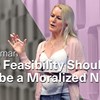feasibility
Eva Erman: Why feasibility need not and should not be a moralized notion
Venue: Institute for Futures Studies, Holländargatan 13 in Stockholm, or online. Research seminar with Eva Erman, Professor of Political Science at Stockholm University. Her research focuses on democrat

Eva Erman: Why Feasibility Need Not and Should Not be a Moralized Notion
Research seminar with Eva Erman, Professor of Political Science at Stockholm University. Her research focuses on democratic theory, specifically on questions of democracy beyond the state, in a global
A patch to the possibility part of Gödel’s Ontological Proof
in Analysis, Volume 80, Issue 2 AbstractKurt Gödel’s version of the Ontological Proof derives rather than assumes the crucial (yet controversial) Possibility Claim, that is, the claim that it is possib
An Ombudsman for Future Generations, Legitimate and Effective?
in: Institutions For Future Generations, Iñigo González-Ricoy and Axel Gosseries (red.), Oxford: Oxford University Press. 117-134. This chapter examines the possibility to establish ombudsmen as instr
Population axiology and the possibility of a fourth category of absolute value
i: Economics and Philosophy Vol. 36:1 AbstractCritical-Range Utilitarianism is a variant of Total Utilitarianism which can avoid both the Repugnant Conclusion and the Sadistic Conclusion in population
What Future for Social Investment?
Institute for Futures Studies Research Report 2009/2, 101p. This report assesses the diversity feasibility, but also the relevance of the social investment strategy in Europe. What policies have been i
The Triviality Worry About Gender Terms and Epistemic Injustice
Social Epistemology Abstract According to contextualism, a gender term such as ‘woman’ does not invariantly refer to a specific social orbiological kind. Instead, gender terms have different extensions dincludingexcluding
Martin O'Neill: Limiting Markets: Socialisation, Decommodification, and the Sense of Justice
Venue: Institutet för framtidsstudier, Holländargatan 13, 4th floor, Stockholm, or online.Research seminar with Martin O'Neill, Professor of Political Philosophy, University of York.Register here AbstraMy talk addresses the questions of the size of the public sector in a just society, and the range of goods and services which should be decommodified, and provided to citizens outside of market relationships, in such a society. I examine some of the different answers given to these questions by (a) liberal egalitarians (particularly Rawls) and (b) social democrats and democratic socialists (particularly Esping-Andersen). Then, making use of the work of theorists including Waheed Hussain and Ralph Miliband, I examine the plausibility of a 'left Rawlsian' position, which would marry socialist insights about the functions of public provision with a liberal egalitarian account of the principles of justice, in order to defend an institutional model of a just society which would embody a form of liberal democratic socialism."

Limiting Markets: Socialisation, Decommodification, and the Sense of Justice
Research seminar with Martin O'Neill, Professor of Political Philosophy, University of York. My talk addresses the questions of the size of the public sector in a just society, and the range of goods









